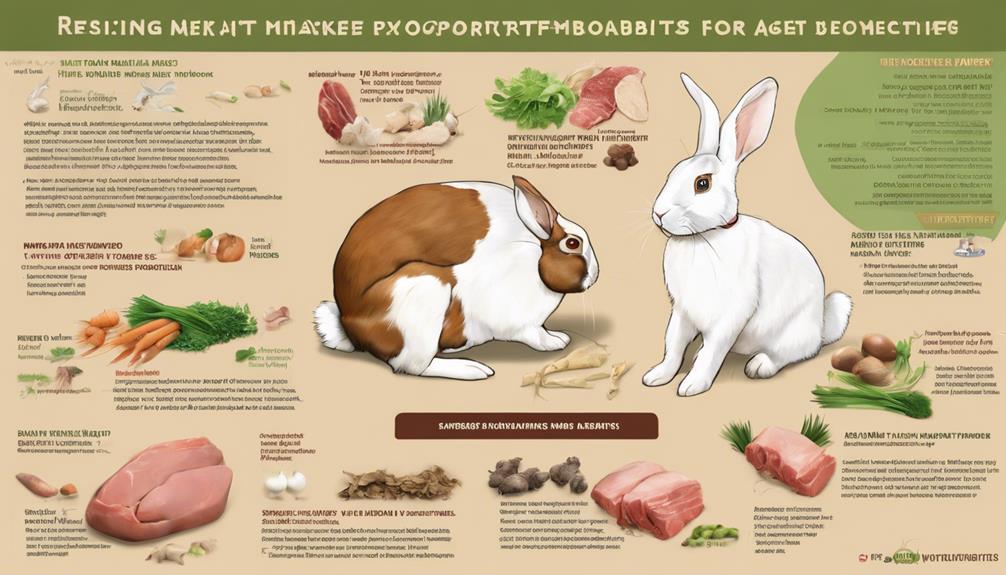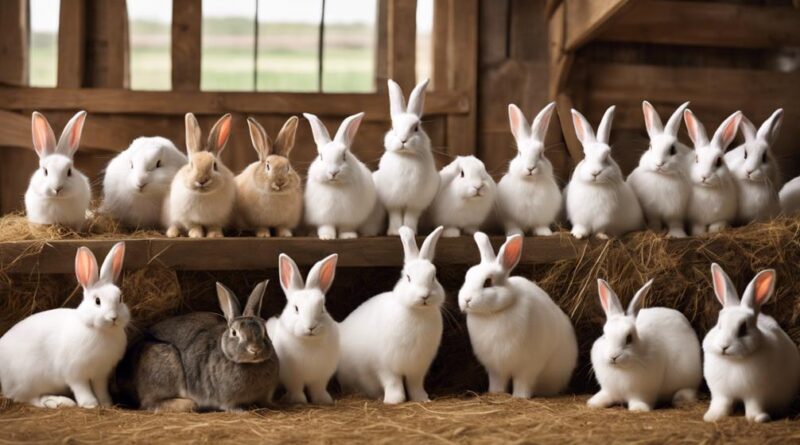Why Raise Rabbits for Agricultural Purposes?
Raising rabbits for agricultural purposes benefits you through sustainable meat production, efficient resource utilization, and enhanced soil fertility. Rabbit farming offers a cost-effective way to produce high-quality meat and fur, with lean, nutrient-rich meat and valuable manure for soil health. Their quick reproduction rate maximizes resources, while their space efficiency and fast growth make them ideal for urban farming. Additionally, selective breeding and diverse market opportunities provide economic viability. Embrace eco-friendly practices with natural pest control and soil enrichment. These advantages showcase why raising rabbits can lead to a successful and environmentally conscious agricultural venture.
Benefits of Rabbit Farming
Raising rabbits for agriculture offers a sustainable and efficient method of producing high-quality meat and fur. When it comes to healthy protein sources, rabbits are a top choice. Their meat is lean and packed with essential nutrients, making it an excellent option for those looking to maintain a balanced diet. In fact, rabbit meat is known for its high protein content, providing around 25-30% protein per serving. This makes it a valuable protein source for individuals aiming to increase their protein intake without consuming excess fats.
In addition to being a healthy protein option, rabbit farming provides cost-effective nutrition. Compared to larger livestock animals like cows or pigs, rabbits require less space, feed, and resources to thrive. They've a rapid reproduction rate, with does being able to produce multiple litters each year. This means that the cost of raising rabbits for meat is relatively low, making it an attractive option for farmers looking to maximize their resources.
Sustainable Meat Production
To ensure sustainable meat production, strategic breeding practices and efficient resource management are essential. When it comes to ethical consumption and environmental impact, raising rabbits for meat can be a more sustainable choice compared to other livestock options. Rabbits have a higher feed efficiency, meaning they require less food to produce the same amount of meat as other animals. This results in lower greenhouse gas emissions and less strain on resources.
In terms of animal welfare, rabbits are well-suited for farming. They've a lower environmental impact compared to larger livestock animals like cattle or pigs. Additionally, their small size and gentle nature make them easier to handle and care for in farming operations.
Resource efficiency is another key factor in sustainable meat production. Rabbits have a shorter reproductive cycle compared to other livestock, allowing for quicker turnover and increased production. This efficiency translates to less water and feed needed per unit of meat produced.
Fertilizer for Crop Growth
When considering fertilizer for crop growth in agricultural practices, optimizing nutrient availability and uptake is crucial for maximizing yields and ensuring sustainable farming outcomes. Soil enrichment plays a fundamental role in supporting plant growth by providing essential nutrients to crops. One effective way to enhance soil fertility is through nutrient recycling, a process that involves using organic materials like rabbit manure as natural fertilizers.
Rabbit manure is a valuable source of nutrients such as nitrogen, phosphorus, and potassium, which are essential for plant growth. When applied to the soil, rabbit manure gradually releases these nutrients, promoting healthy crop development. The organic matter in rabbit manure also improves soil structure, enhancing water retention and aeration, which are vital for plant root health and overall growth.
In sustainable farming practices, utilizing rabbit manure as fertilizer not only enriches the soil but also reduces the reliance on synthetic fertilizers. This shift towards organic fertilization methods contributes to long-term soil health and minimizes environmental impacts associated with chemical fertilizers. By incorporating nutrient-rich rabbit manure into agricultural systems, farmers can support plant growth effectively while pursuing environmentally friendly and sustainable farming practices.
Utilization of Rabbit Manure
How can rabbit manure be efficiently utilized to enhance soil fertility and promote sustainable crop growth in agricultural systems?
Rabbit manure is a valuable resource that can significantly benefit soil enrichment and crop production. When properly managed, rabbit manure can be a powerful organic fertilizer that provides essential nutrients to plants while improving soil structure.
Here are some key ways in which rabbit manure can be utilized effectively:
- Composting benefits: Rabbit manure is an excellent component for creating nutrient-rich compost. When mixed with other organic materials such as straw, leaves, and kitchen scraps, rabbit manure speeds up the composting process and helps in the breakdown of organic matter. This results in a high-quality compost that can be used to nourish plants and enhance soil health.
- Soil enrichment: The nutrient content of rabbit manure, including high levels of nitrogen, phosphorus, and potassium, makes it a potent soil amendment. When applied to the soil, rabbit manure releases these essential nutrients slowly, providing a sustainable source of fertilization for crops. This enriches the soil, promotes microbial activity, and supports overall plant growth.
Low Space Requirement
With the increasing demand for sustainable agricultural practices, optimizing space for rabbit farming has become a crucial consideration in maximizing productivity. Rabbits are known for their space efficiency, making them an ideal livestock option for urban farming settings where space is limited. Due to their small size and ability to thrive in compact environments, rabbits require minimal space compared to larger livestock animals like cows or pigs.
Urban farming initiatives have been increasingly turning to rabbit farming due to its low space requirements. A single rabbit only needs about 2 to 6 square feet of space, depending on the breed and size, making them highly suitable for small backyard setups or even indoor farming operations. This space efficiency allows for high stocking densities, enabling farmers to raise a significant number of rabbits in a relatively small area.
In urban areas where land availability is limited and expensive, the low space requirement of rabbit farming presents a practical solution for individuals looking to produce their own food sustainably. Furthermore, the ease of managing rabbits in confined spaces contributes to their appeal for urban farmers seeking efficient livestock options. In conclusion, incorporating rabbit farming into urban agricultural practices can significantly increase food production in a space-efficient and sustainable manner.
Quick Reproduction Rate
Optimizing space for rabbit farming not only maximizes productivity but also capitalizes on the quick reproduction rate of these animals, making them a strategic choice for efficient livestock management. When considering raising rabbits for agricultural purposes, their rapid breeding capabilities play a vital role in increasing income through the implementation of effective animal husbandry techniques.
- Gestation Period: Rabbits have a short gestation period of about 31 days, allowing for frequent breeding cycles throughout the year.
- Large Litters: A single rabbit can produce a large litter of kits, ranging from 4 to 14 babies, which significantly boosts the production potential.
- Early Maturity: Unlike many other livestock species, rabbits reach sexual maturity quickly, with some breeds ready to breed as early as 4 to 5 months old.
- Continuous Breeding: With proper management, rabbits can breed continuously, ensuring a steady supply of offspring for sale or meat production.
Diverse Market Opportunities

Diverse market opportunities for rabbit farming present unique avenues for revenue growth and market expansion. The economic viability of rabbit farming is notable due to their rapid reproduction rates and efficient feed conversion, making them a cost-effective protein source. Additionally, the export potential for rabbit products is substantial, with a growing demand for rabbit meat, fur, and related products in various international markets.
Genetic diversity in rabbits offers significant advantages for selective breeding opportunities. By strategically breeding rabbits with desirable traits such as fast growth rates, high meat yields, or specific fur qualities, farmers can tailor their production to meet specific market demands. This selective breeding not only enhances the quality of the end products but also opens up niche markets that cater to varying consumer preferences.
Furthermore, the versatility of rabbit products allows for diversification within the market. Rabbit meat is lean, high in protein, and low in cholesterol, appealing to health-conscious consumers. Rabbit fur, known for its warmth and softness, is sought after in the fashion industry. By tapping into these different market segments, rabbit farmers can maximize their revenue streams and mitigate risks associated with fluctuations in specific market demands.
Eco-Friendly Farming Practices
Implementing sustainable farming practices is crucial for reducing environmental impact and ensuring long-term viability in rabbit farming. To achieve eco-friendly rabbit farming, consider the following key practices:
- Natural Pest Control: Introducing natural predators like certain bird species or using plant-based repellents can help control pest populations without the need for harmful chemicals. This not only maintains a balanced ecosystem but also ensures the health of your rabbits without exposing them to synthetic pesticides.
- Soil Enrichment: Utilizing methods such as crop rotation, cover cropping, and composting can enhance soil fertility naturally. Healthy soil promotes better forage growth, which in turn benefits the rabbits by providing them with a nutritious diet. Additionally, enriched soil helps in water retention and reduces erosion risks on your farm.
- Water Conservation: Implementing water-efficient irrigation systems, such as drip irrigation, and collecting rainwater can significantly reduce water wastage on your farm. Conserving water not only helps the environment but also lowers operational costs in the long run.
- Energy Efficiency: Incorporating renewable energy sources like solar panels or wind turbines can reduce reliance on non-renewable energy, decreasing your farm's carbon footprint. By harnessing natural resources, you can cut down on energy expenses while minimizing environmental harm.
Frequently Asked Questions
Are There Any Common Health Issues in Rabbits That Farmers Should Be Aware Of?
When raising rabbits for agricultural purposes, it's important to be aware of common health issues. Breeding challenges can arise, so proper handling and monitoring are crucial.
Ensuring rabbits have balanced dietary requirements is essential for their health. Parasite prevention should be a priority to maintain their well-being.
What Are the Best Practices for Ensuring the Welfare of Rabbits on a Farm?
To enhance the welfare of rabbits on your farm, focus on improving housing conditions and nutrition management.
Ensure that the housing structures provide adequate space, ventilation, and protection from harsh weather.
Implement a balanced diet rich in fiber, vitamins, and minerals to support their health and growth.
Regularly assess and adjust these practices to meet the evolving needs of your rabbit population for optimal well-being and productivity.
How Can Rabbit Farming Contribute to Local Economies and Communities?
Rabbit farming can have a significant economic impact on local economies by providing job opportunities and contributing to community development.
The social benefits of raising rabbits include fostering a sense of community and promoting sustainable agriculture practices.
Job creation in the rabbit farming industry can lead to increased income levels and stimulate economic growth within communities.
Ultimately, integrating rabbit farming into agricultural practices can have positive implications for both local economies and communities.
What Are the Key Factors to Consider When Selecting Rabbit Breeds for Farming?
When selecting rabbit breeds for farming, focus on genetics selection and breeding techniques to ensure strong, healthy offspring.
Consider market demand and profitability analysis to choose breeds that align with consumer preferences and offer good returns on investment.
Is There a Significant Difference in the Taste and Quality of Rabbit Meat Compared to Other Meats?
When it comes to taste and quality, rabbit meat stands out for its unique flavor profile and tenderness. Due to its low fat content and high protein levels, rabbit meat offers excellent nutritional benefits.
The meat can be cooked in various ways, from grilling to braising, making it versatile for different culinary trends.
Consumer preferences are shifting towards leaner meats, positioning rabbit as a favorable choice in today's health-conscious market.
Conclusion
In conclusion, raising rabbits for agricultural purposes offers a range of benefits that make it a practical and sustainable choice for farmers.
With their fast reproduction rate, low space requirements, and diverse market opportunities, rabbits provide a valuable source of meat production and fertilizer for crop growth.
By utilizing rabbit manure and implementing eco-friendly farming practices, farmers can optimize their operations and contribute to a more efficient and environmentally conscious agricultural industry.
